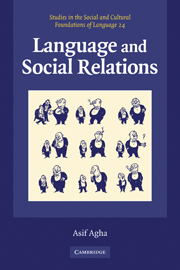Book contents
- Frontmatter
- Contents
- List of figures
- List of tables
- Acknowledgments
- Typographical conventions
- Introduction
- 1 Reflexivity
- 2 From referring to registers
- 3 Register formations
- 4 The social life of cultural value
- 5 Regrouping identity
- 6 Registers of person deixis
- 7 Honorific registers
- 8 Norm and trope in kinship behavior
- Notes
- References
- Index
- STUDIES IN THE SOCIAL AND CULTURAL FOUNDATIONS OF LANGUAGE
6 - Registers of person deixis
Published online by Cambridge University Press: 05 September 2012
- Frontmatter
- Contents
- List of figures
- List of tables
- Acknowledgments
- Typographical conventions
- Introduction
- 1 Reflexivity
- 2 From referring to registers
- 3 Register formations
- 4 The social life of cultural value
- 5 Regrouping identity
- 6 Registers of person deixis
- 7 Honorific registers
- 8 Norm and trope in kinship behavior
- Notes
- References
- Index
- STUDIES IN THE SOCIAL AND CULTURAL FOUNDATIONS OF LANGUAGE
Summary
Introduction
The purpose of this chapter is to discuss emblems of social personhood associated with ways of referring to interlocutors. We will be concerned with a number of traditional topics in linguistic anthropology and pragmatics, such as ‘polite’ pronouns, forms of address and the construal of indirection as a form of politeness. These phenomena all share an underlying property. They are based on a reflexive reanalysis of patterns of deictic usage in human languages. The reanalysis converts patterns of participant deixis (i.e., forms that indexically denote speaker or addressee; see 1.4) into stereotypic social indexicals, whether indexical of speaker's own attributes or relationship to interlocutor, thus yielding sociocultural registers of person deixis. Thus, to take a familiar example, the French pronouns tu and vous are both deictics that indexically denote addressee as referent; but they differ in stereotypic social indexicality since one is enregistered as ‘polite’ and the other is not.
The term ‘social deixis’ is sometimes used to describe these phenomena but the term conflates two distinct indexical layers of the phenomenon (participant deixis vs. stereotypic social indexicality) and therefore makes it difficult to distinguish cases where the two are linked from cases where they are not. One way of distinguishing these two types of indexicality at the outset is to note that contrasts of accent (Chapter 4) involve stereotypes of social indexicality but no deixis.
- Type
- Chapter
- Information
- Language and Social Relations , pp. 278 - 300Publisher: Cambridge University PressPrint publication year: 2006



